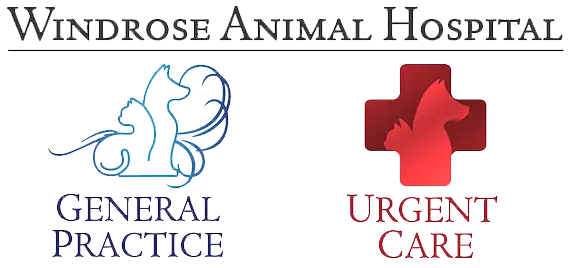2024 NextDoor "Neighborhood Fave"
Thank you for making Windrose Animal Hospital your favorite!
We're honored to serve the Cranberry Township community with exceptional pet care.
The Importance of Deworming Your Dog
Deworming is an essential part of keeping your dog healthy and protecting them from potential harm caused by parasitic worms. These worms can live in your dog's intestinal tract, causing issues like malnutrition, vomiting, diarrhea, and intestinal blockages. Some worms can even be transmitted to humans, making deworming a matter of public health as well. Regular deworming treatments eliminate these parasites from your dog's system, allowing them to absorb nutrients properly and preventing the discomfort and potential complications of an untreated worm infestation.

Common Internal Parasites Found in Dogs
For the well-being of your beloved canine companion, it's crucial to follow your veterinarian's recommendations for deworming medications and schedules. Regular deworming helps protect dogs from the following internal parasites:
- Roundworms: These large intestinal worms are one of the most common worm infections in puppies. They can cause vomiting, diarrhea, potbelly appearance, and stunted growth.
- Hookworms: These small, hook-shaped worms attach to the intestinal lining and feed on blood, potentially causing anemia in severe cases.
- Whipworms: These worms live in the cecum and colon and can cause bloody diarrhea, weight loss, and general unthriftiness.
- Tapeworms: These segmented flatworms are contracted from fleas or undercooked meat. They can cause weight loss and irritation around the anus.
- Heartworms: Transmitted by mosquitoes, these worms migrate to the heart and lungs, leading to coughing, lethargy, and potential heart failure if untreated.
- Giardia: This single-celled parasite causes diarrhea and can be transmitted through contaminated water or feces.
For More Details:
How Do Intestinal Parasites Impact Your Dog's Health?

How Do Intestinal Parasites Impact Your Dog's Health?
Intestinal worms like roundworms, hookworms, and whipworms feed on your dog's blood, nutrients, and tissues, leading to malnutrition and impaired growth - especially in puppies. Large worm burdens can cause intestinal blockages, vomiting, diarrhea, and abdominal discomfort. Some worms attach to the intestinal lining, causing inflammation and bleeding that robs your dog of vital nutrients and iron, potentially resulting in anemia. The irritation from worms can also cause your dog to develop a poor appetite and lose weight.

Beyond these direct effects, many intestinal parasites can transmit diseases to humans as well, making deworming essential from a public health standpoint - especially for households with children. Dogs can shed worm eggs in their feces, which can then contaminate soil and be inadvertently ingested. Children tend to play in the dirt and put objects in their mouths, putting them at risk of infection from these parasites if your dog is not properly dewormed.
Signs and Symptoms of Intestinal Parasites in Dogs
While some symptoms can be caused by other conditions, if you notice any combination of them in your dog, it's a good idea to have your veterinarian test for the presence of intestinal parasites through fecal exams or other diagnostic methods. Here are some common signs that may indicate your dog has intestinal parasites:
- Diarrhea
- Vomiting
- Weight loss
- Pot-bellied appearance
- Poor appetite
- Scooting/dragging rear end
- Visible worms in feces or around the anus
- Coughing (in case of heartworms)
- Lethargy
- Dull, unhealthy coat
- Pale gums (indicating anemia)
- Failure to grow properly (in puppies)
- Abdominal pain or discomfort
- Restlessness or irritability
- Bloating
- Constipation
- Skin irritation around the anus
- Dehydration
Treatment Options for Deworming
Depending on your dog's age, worm burden, and risk factors, there are several different veterinary treatment options for deworming. Your veterinarian can recommend an appropriate deworming protocol for your pet.
Oral Dewormers
These are typically given as pills, liquid, or powder added to food. Common oral dewormers include Simparica Trio, Heartgard, and ProHeart. They work by paralyzing or killing intestinal worms.
Topical Dewormers
These are spot-on liquids applied to the skin that get absorbed into the bloodstream. Topicals treat intestinal worms as well as heartworms and some external parasites.
Injectable Dewormers
Medications like moxidectin are injected under the skin to treat intestinal worms and prevent heartworm disease. These are convenient for annual deworming.
Heartworm Prevention
Monthly oral or topical medications containing ivermectin, milbemycin, moxidectin, or selamectin help prevent heartworm infections transmitted by mosquitoes.
Deworming Schedules
Puppies need deworming every 2-4 weeks until 12 weeks old, then monthly until 6 months. Adult dogs may need 1-2 times per year deworming based on risk and fecal testing.
For More Information:
How Can Internal Parasites Be Prevented?

How Can Internal Parasites Be Prevented?
Protecting your canine companion from the dangers of internal worms starts with basic preventive care. Promptly dispose of your dog's feces to remove any shed worm eggs from the environment and practice good hygiene. Discourage your dog from eating rodents, birds, or other potential parasite sources. Keep your dog on year-round heartworm prevention medication, as these products also help control other types of worms. Have your veterinarian perform routine fecal exams and deworm your dog on the recommended schedule - this is especially crucial for puppies who are more susceptible.

Reduce exposure risks by not allowing your dog to drink standing water that could be contaminated. Maintaining your dog on a quality diet and keeping their living area clean also promotes overall health to better withstand parasites. With these straightforward preventive measures, you can effectively protect your furry friend from the dangers of internal worms.
Call Today for Dog Deworming in Pennsylvania
Don't let internal parasites compromise your dog's health and well-being. Schedule your pet's deworming appointment today with our compassionate veterinary hospital in Cranberry Township. We ensure your dog stays healthy and happy by providing comprehensive deworming and preventive care.
Keep In Touch
Contact Us
Cranberry Township
- 1658 Rt. 228
Cranberry Twp, PA 16066 - info@windrosevet.com
- (724) 442-9753
Valencia
- 4079 Adair Ave
Valencia, PA 16059 - valencia@windrosevet.com
- (724) 453-4037
Opening Hours
General Practice
Walk-In Urgent Care
Monday-Saturday: 1-8 p.m.
Sunday: Closed
**Additional hours coming soon!
Valencia
Holiday Closures
Memorial Day
July 4th
Labor Day
Thanksgiving Day
Early Closure Christmas Eve*
Christmas Day
Early Closure New Years Eve*
New Years Day
*General Practice Only


